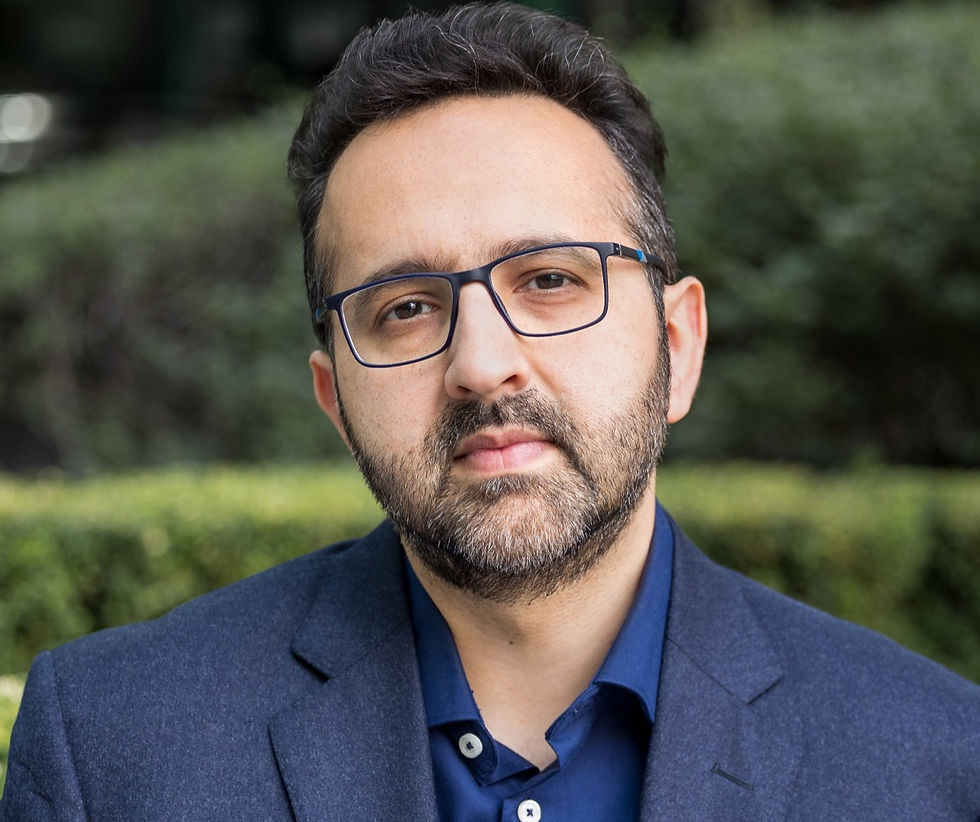On Creative Writing (OCW) founders Emma and Sheelagh are really happy to introduce this new Q&A feature: Writers Reveal. Authors and writers from around the world will select five questions from our list of ten, and their answers will reveal lots about their lives as writers and their writing.
Author Saad Omar Khan

Saad Omar Khan was born in the United Arab Emirates to Pakistani parents and lived in the Philippines, Hong Kong, and South Korea before emigrating to Canada.
He is a graduate of the University of Toronto and the London School of Economics and has completed a certificate in Creative Writing from the School of Continuing Studies (University of Toronto), where he was a finalist for the Random House Creative Writing Award (2010 and 2011) and for the Marina Nemat Award (2012).
In 2019, Saad was longlisted for the Guernica Prize for Literary Fiction. His short fiction has appeared in Best Canadian Stories 2025 and other publications. Saad’s debut novel Drinking the Ocean will be published by Buckrider Books/Wolsak & Wynn in May 2025. Saad lives outside of Toronto and is currently working on his second novel. Discover more: www.saadomarkhan.com.
On Creative Writing: Has your writing evolved over the years? If so, how? Through writing experience? Reading a lot? Writing courses or communities? A combination, or something else?
A poetic quality, and the pursuit of precision
Saad Omar Khan: I have an attraction to writing that has a poetic quality to it, and that is evident in my own writing style. This style, though, had to develop over time. My first attempts at writing often lacked polish and precision, with too much of an emphasis on how the words and sentences sounded rather than what they meant. Because so much of my writing came from a deeply emotional place, I had to learn how to move from a more stream of conscious way of storytelling to a form that was more structured, and more
pointed in how I used my words. This came through a lot of reading, but it also came from doing writing courses and seeking the eye of writing circles who could help me self-edit.
On Creative Writing: Can you trace any common themes across your writing?
Saad Omar Khan: On the surface, themes of migration, religion, love, and family dynamics are common throughlines in my fiction.
Undergirding all those themes is a broader and, from my perspective, a more universal one: how our emotional and spiritual ideals often rub uncomfortably against reality. Most of my characters are people who think and feel deeply and lead rich inner lives that don’t often match the prosaic reality around them. The conflict they face often manifests itself as a series of questions: what principles do I sacrifice—and what ideals must I fight for—in order to live properly in this world?
At the intersection of plotter and pantser approach!
On Creative Writing: Are you a plotter or a pantser? (For writers or short stories and novels).
Saad Omar Khan: For the most part, in both my short stories and in my first novel, I write as a panster. Much of my writing comes in the forms of either ideas that I want to see through, or images or scenes that form a bedrock of a narrative that I want to develop at a later point. Plot mechanics are important, and ideas and images need to be woven into a story thread, but I find that process is typically secondary for me.
That being said, my current novel straddles the line between the plotter and pantser method of writing, as I have developed a barebones plot outline that serves as an internal mental guide, with enough flexibility to change and adapt the outline if new ideas come to me. I wanted to be more intentional in this process with my second novel, partially to save myself time (discovering a story through pantsing can be time-intensive), and partially because I intended this novel to be more plot-centred than the first.
Read widely, find your reader, and guide them
On Creative Writing: What advice/guidance would you give to writers?
Saad Omar Khan: Read, especially reading outside of your form and genre of choice. Novelists should read poetry (or vice versa). Literary writers should read science fiction (or vice versa). Being omnivorous in your reading taste allows for a wider market for you to obtain ingredients for your writerly stew.
Write for the most ideal and most sophisticated reader. This includes challenging yourself to write with more dynamism, more verve, more precision, and more attention to using the proper word at the proper time. We need more authors who can hit readers with sentences and imagery that stands above the crowd.
Reveal your identity, but don't forget essential storytelling ingredients
Bring your full personhood into your story, but don’t forget about technique. I recently reviewed submissions for a literary grant, and one common thread I found in most of the entries was a desire on the part of authors to write fiction where the focus was on showcasing their personal identities without always paying attention to the building blocks of storytelling (i.e. character, plot, style, atmosphere). Your story must be reified in a way that it becomes the reader’s story. Take the reader somewhere and guide them along the path of your tale without leaving them lost in the woods, assuming they already have a map to the meadow beyond the trees.
Finding the sculpture within the marble
On Creative Writing: Do you edit as you write, or write and edit later?
Saad Omar Khan: I rarely, if ever, edit as I write. My first drafts are me creating marble from scratch. My editing process is chipping away at that marble to find the sculpture, or, as can be the case, the sculpture within the sculpture.
Comments